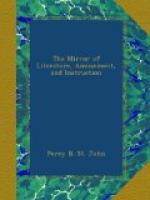to some man who is known to have suffered from the
infidelity of his wife, from a superstitious notion,
that thereby the rest will be preserved from mischance.
Sometimes the cake is so thin, as to be carried by
the current of the air up into the chimney. As
the baking is wholly performed by the hand, a great
deal of noise is the consequence. The beats,
however, are not irregular, nor destitute of an agreeable
harmony, especially when they are accompanied with
vocal music, which is frequently the case. Great
dexterity is necessary, not only to beat out the cakes
with no other instrument than the hand, so that no
part of them shall be thicker than another, but especially
to cast them from one board to another without ruffling
or breaking them. The toasting requires considerable
skill; for which reason the most experienced person
in the company is chosen for that part of the work.
One cake is sent round in quick succession to another,
so that none of the company is suffered to be idle.
The whole is a scene of activity, mirth, and diversion.
As there is no account, even by tradition itself, concerning
the origin of this custom, it must be very ancient.
The bread thus baked was, doubtless, never intended
for common use. It is not easy to conceive how
mankind, especially in a rude age, would strictly observe
so many ceremonies, and be at so great pains in making
a cake, which, when folded together, makes but a scanty
mouthful.[16] Besides, it is always given away in
presents to strangers who frequent the fair. The
custom seems to have been originally derived from paganism,
and to contain not a few of the sacred rites peculiar
to that impure religion; as the leavened dough, and
the mixing it with sugar and spices, the consecrated
ground, &c.; but the particular deity, for whose honour
these cakes were at first made, is not, perhaps, easy
to determine. Probably it was no other than the
one known in Scripture (Jer. 7 ch. 18 v.) by the name
of the Queen of Heaven, and to whom cakes were likewise
kneaded by women.
J.S.W.
[15] These names are descriptive of the manner in which the women, so called, perform their part of the work, To todle, is to walk or move slowly, like a child; to trodle, is to walk or move more quickly.
[16] From our Correspondent’s
description of these cakes, we
suppose them to resemble the
wafers sold by the confectioners,
except in the elegant designs
on their surface.
* * * * *
SONG.
FROM METASTATIO.
(For The Mirror.)
How in the depth of winter rude
A lovely flower is prized,
Which in the month of April view’d,
Perhaps has been despised.
How fair amid the shades of night
Appears the stars’ pale
ray;
Behold the sun’s more dazzling light,
It quickly fades away.
E.L.I.




